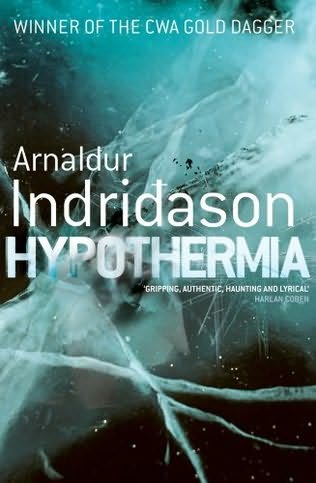
A woman wanting to get away from it all borrows her friend's cottage. It's a cold autumn night and she arrives to discover her friend hanging from a beam. Everyone believes it's suicide. The dead woman had been depressed since the death of her mother two years earlier. However the friend doesn't believe it and approaches Detective Erlandur.
Erlandur is interested enough to begin an unofficial investigation. At the same time he is haunted by the mysterious disappearance of two young people over thirty years earlier.
There is something very disconnected about HYPOTERHMIA which didn't quite work for me. For a start all Erlandur's investigations are unofficial. He isn't on vacation; so how is he allowed to take all this time to persue private interests? His colleagues make only the briefest of appearances at the beginning of the book and take no further part. In fact they aren't even mentioned.
Erlandur's daughter, Eva Lind then begins to nag Erlandur to meet up with his ex-wife and talk to her. He asks her why but she doesn't really give any answer. When they do meet there are recriminations on both sides. Nothing is really achieved. The thread is then dropped. It doesn't relate to anything else in the book; it just hangs there on its own without any resolution at all.
There is also a thread about Erlandur's childhood trauma of being lost in the snow with his father and brother. His brother was never found. Again it seems to be a thread hanging there and not connected to anything else at all.
The whole family is somewhat dysfuncational and Erlandur in particular has great difficulty communnicating. It can make for frustrating reading.
While the plot of HYPOTHERMIA is interesting enough, the disconnection of the plot threads and Erlandur from everyone around him, make the book less than satisfying.





6 comments:
Sunnie - Thanks for your review. I haven't read Hypothermia yet. I've read excellent reviews of it and poor reviews, and honestly haven't made up my mind whether to bump it up on my TBR list. Hmmmm...
I have to admit I had mixed feelings about the book too.
Perhaps it was my personal prejudices at play where I felt it needed to have connection to something but didn't seem to.
I'm sorry you didn't enjoy this book so much, Sunnie. I was one of the people who loved it, but then I adore misery, gloom and depression!
Re the part about Eva Lind, etc, I thought that it was fairly well connected, in that Erlunder and his ex-wife (forget her name) are increasingly hopelessly like children as the books progress, and Eva and her brother (again, forget name, sorry) are becoming more and more mature (Eva from the pits), and now are almost like the parents themselves. And it is Eva's insistence in the parents' meeting that makes Erlunder read her the passage from the book about the two boys being lost.....and also the reader realises why Erlunder got together with his wife in the first place (as he was so vulnerable after his mother's death).
But - each to her own! I can see that this book isn't to everyone's taste. It certainly isn't action-packed, that's for sure.
Most of the reviews I have seen have been very positive. I have not read the one before it yet so I wouldn´t know but I have been impressed by most of his books so far.
I know he sometimes leaves plot threads, but usually he picks them up in later books so I don´t mind really. What I hate is when authors forget to solve one of the main crimes of their books.
After I posted my review I looked for what others said and came across your review, Maxine.
The book could have suffered from the fact that I have only read one other in the series and wasn't au-fait the the whole story arc of the family and the evolution of the characters.
I read Arctic Chill a while back and enjoyed it much more than HYPOTHERMIA, Dorte.
I was never comfortable with the unexplained leeway Erlandur had with pursuing his own private investigations while at work. Perhaps it coloured my entire view of the book.
Post a Comment